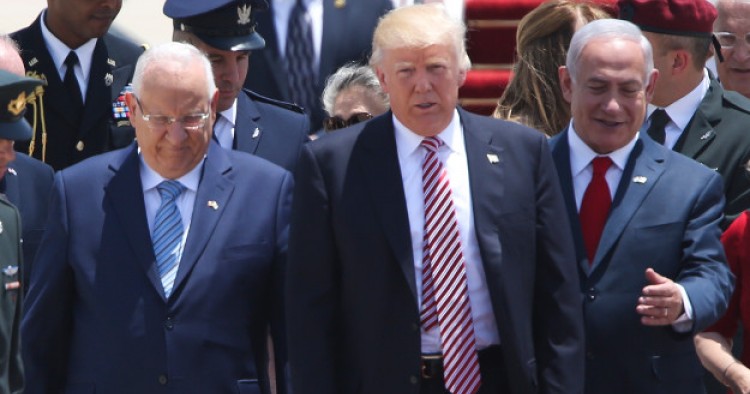In this week's Monday Briefing, MEI experts Yousef Munayyer, Alex Vatanka, Jonathan M. Winer, and Marvin G. Weinbaum provide analysis on recent and upcoming events including President Trump's trip to Israel and the prospects for a peace process, the reelection of Iranian President Hassan Rouhani, Russia's planned naval drill off the coast of Libya this week, and the Afghan Taliban's decision to reject peace talks.
Chances for MidEast Peace Remote with Trump
Yousef Munayyer, MEI Scholar
President Donald Trump is escaping the political tumult in Washington with a trip to the Middle East. On his first foreign trip as president, Trump is sending the message that even an “America First” White House has the region high on its priority list.
But if Trump is looking to Palestine/Israel as an opportunity to find an achievement, he will be significantly disappointed. Both the Israelis and Palestinians are aware that even a more traditional American president is unlikely to have the political will to do what is necessary to broker a just peace agreement. With Trump, they know the chances are even more remote. At the same time, neither can afford to alienate Washington. So they must carefully play along as Trump engages the issues, and they will likely seek opportunities to get whatever they can from him in the process.
By this point, reporting has made clear that Trump is not interested in the details of policy issues. The trip he will be making to Palestine/Israel will put him face-to-face with some of the realities on the ground. If he can learn from this trip some of the nuances of the issue, including a better understanding of the reality of military occupation the Palestinians endure, he might better appreciate precisely what needs to change for there to be peace.
Rouhani Re-Elected in Iran
Alex Vatanka, Senior Fellow
Hassan Rouhani’s re-election was secured by an impressive margin against his hardline rival, Ebrahim Raisi. Still, Rouhani won not so much because of a convincing message, but because the alternative to him appeared to ordinary Iranians to be a vote for even more regressive policies. The key to Rouhani’s victory was the high voter turnout, which invariably favors reformists and moderate candidates.
In order to bring out the vote, Rouhani had no option but to go on a full-out assault against state organs in the hands of the unelected hardline interest groups. The powerful Islamic Revolution Guards Corps bore the brunt of Rouhani’s attacks. In his first press conference after the elections, Rouhani continued to blast the I.R.G.C. for its involvement in factional politics, even though it is meant to be impartial.
And yet, at the same press conference, Rouhani also showed that he is unwilling to put himself on a collision course with Supreme Leader Ayatollah Ali Khamenei. He dodged a question about the fate of top opposition leaders under house arrest as he knows full well that file sits with Khamenei only.
He has now twice gotten himself elected on a pledge to have political prisoners freed, only to walk back on his promise. In the next four years, Rouhani will pick his fights very carefully. He will seek to cajole Khamenei that the future of the Islamic Republic can only be safeguarded if the regime begins to echo some key wishes of the Iranian people. Meanwhile, Rouhani is now better placed to eye the supreme leadership once the 77-year-old Khamenei passes away.
Russia to Hold Navy Drill off Libyan Coast
Jonathan M. Winer, MEI Scholar
For months, Russia has played a complex game in Libya. While blaming the West for Libya’s chaos, it has professed support for the internationally-recognized, Tripoli-based Government of National Accord (G.N.A.) It has simultaneously also cozied up to G.N.A. rejectionist military leader, General Khalifa Hifter, receiving him twice in Moscow and hosting him on its Kutzenov aircraft carrier in January.
By some reports, Russia may already be supplying him military support, despite the U.N. arms embargo in place since Qaddafi’s overthrow. Russia has also supported the rump Libyan government based in the east under House of Representatives (HoR) Speaker Agila Saleh. This support has included its state currency manufacturer printing more than four billion faux dinars for the eastern government starting in 2016, helping fuel the country’s rampant inflation and black-market dinar devaluation.
Now, Russia has issued a notice warning it will conduct “rocket tests” from warships in the Mediterranean off the Libyan coast later this week. The tests could represent little more than a political statement about the ability of Russia to hit terrorists, or anyone else, in Libya should it wish to. Or one that signals further support for General Hifter. Alternatively, the rockets could actually target suspected terrorist training locations near Libyan’s eastern coastline, or even an anti-Hifter militia or other force.
What are Russian’s ultimate Libyan ambitions? Securing a Russian naval base in eastern Libya? Arms for oil? Supporting Hifter so he replaces Qaddafi as Libya’s supreme ruler, beholden to them? Leveraging its diplomatic role to broker a grand bargain? The answer likely lies in what opportunities Libyans, and the reactions of other key actors, permit.
Taliban Rejects Peace Talks
Marvin G. Weinbaum, Director of the Center for Pakistan Studies
The Afghan Taliban’s chief spokesman has categorically rejected holding peace talks with the Kabul government. He referred to any deal as tantamount to surrender and contrary to the Islamic faith. This declaration should come as no surprise, as the Taliban leadership has for some time indicated it did not share the conclusion of the Kabul government and its allies that no military solution to the conflict exists.
The Taliban, which is contesting Afghan security forces over nearly half of the country’s districts, takes a different view. It is confident that the government’s international backers will soon fatigue and a divided Afghan government will crumble from within. Only then perhaps might the Taliban’s leaders be willing to forego seeking military victory and consider a political settlement, but on its own terms—creation of a Sharia state.
The Trump administration’s pending announcement of the deployment of upwards of 5,000 U.S. troops to bolster those already on the ground would seem to belie the notion that the country’s allies will desert it any time soon. But it is difficult to take seriously the recent remark of by U.S. Security Advisor General H.R. McMaster that the limited reinforcement of trainers and anti-terrorist Special Forces can break the purported military stalemate. Those troops are at best able to provide the minimum needed to support the current U.S. mission: buying time militarily for the Afghan state to survive by improving its security forces, building its economy and healing itself politically.
The Middle East Institute (MEI) is an independent, non-partisan, non-for-profit, educational organization. It does not engage in advocacy and its scholars’ opinions are their own. MEI welcomes financial donations, but retains sole editorial control over its work and its publications reflect only the authors’ views. For a listing of MEI donors, please click here.

















